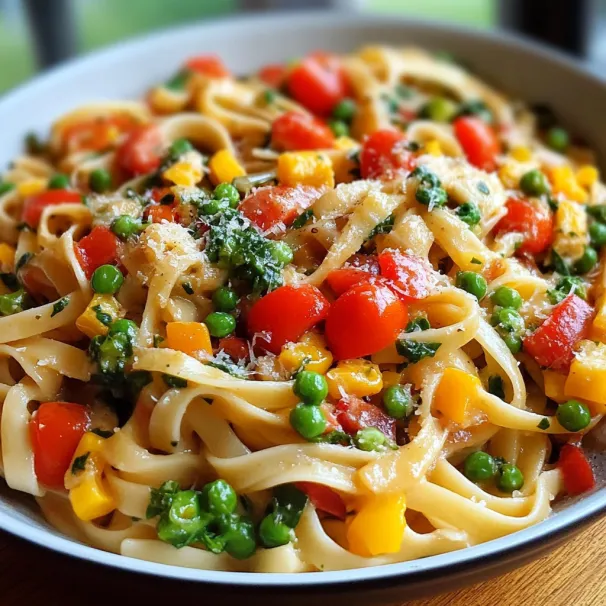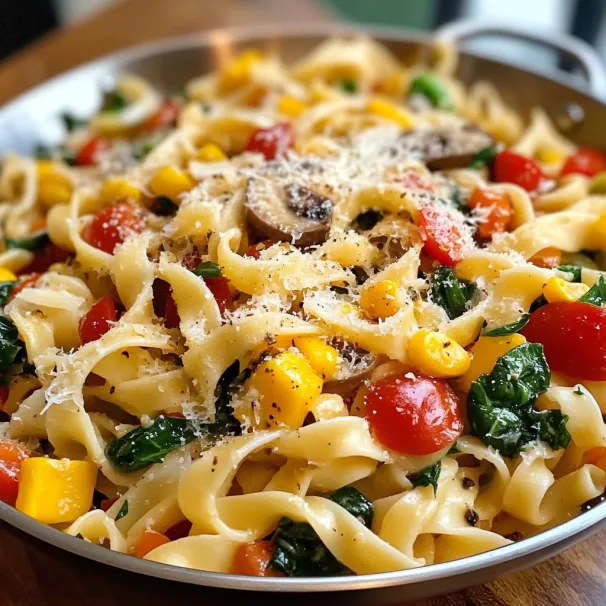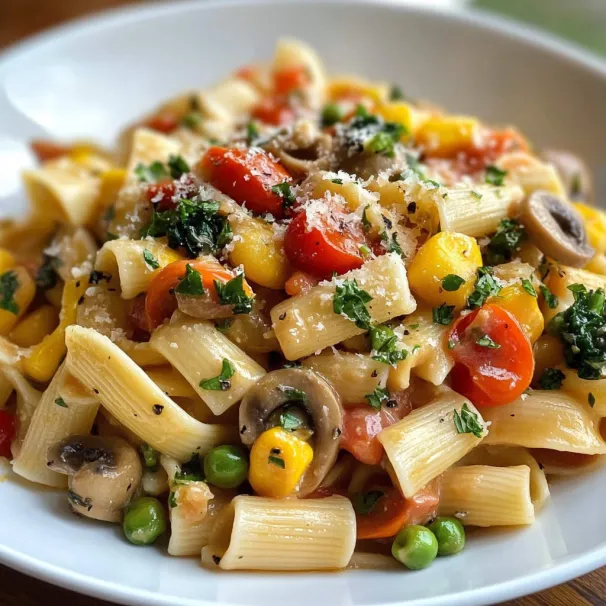 Save
Save
This vibrant Pasta Primavera transforms humble vegetables into a celebration of freshness that brightens any weeknight dinner. The combination of seasonal vegetables and al dente pasta creates a light yet satisfying meal that has become my go-to solution for hectic evenings when I still want something wholesome on the table.
I discovered this recipe during a farmers market haul that left me with too many spring vegetables. What started as a simple clean-out-the-fridge dinner has become our family's favorite way to enjoy vegetables, with my children actually requesting seconds of zucchini and asparagus.
Ingredients
- Extra virgin olive oil brings a peppery fruity foundation that elevates the fresh vegetables
- Garlic cloves thinly sliced rather than minced to provide gentle aromatic flavor without overwhelming
- Yellow squash and zucchini offer complementary textures and mild sweetness perfect for absorbing other flavors
- Asparagus provides earthy brightness and a satisfying bite that stands up well to pasta
- Cherry tomatoes burst with natural sweetness and acidity that balances the richness of the cheese
- Red onion adds a pleasant sharpness that mellows beautifully during cooking
- Frozen peas bring sweet pops of color and nutrition even when fresh peas aren't in season
- Pecorino cheese offers a salty tangy finish that coats the pasta perfectly look for aged varieties for best flavor
- Fresh lemon juice brightens everything with necessary acidity that makes the vegetables shine
- Fresh basil and tarragon provide aromatic herbal notes that make this dish taste truly special
Step-by-Step Instructions
- Prepare Pasta
- Bring a large pot of generously salted water to a rolling boil. The water should taste like the sea to properly season the pasta from within. Cook the penne until just al dente about 1 minute less than package directions suggest. Before draining reserve half a cup of starchy pasta water which serves as insurance for creating a silky sauce later. After draining toss immediately with a light drizzle of olive oil to prevent sticking.
- Sauté Vegetables
- Heat olive oil in a large deep skillet over medium heat until it shimmers but doesn't smoke. Add the sliced garlic and cook for just 30 seconds until fragrant but not browned as burnt garlic will ruin the dish. Add the squash zucchini asparagus cherry tomatoes and red onion all at once creating a colorful medley in the pan. Season with salt and pepper which helps draw moisture from the vegetables. Sauté for exactly 3 to 4 minutes stirring occasionally until vegetables are tender but still have a slight bite maintaining their vibrant colors.
- Combine and Finish
- Add the cooked pasta to the skillet along with thawed peas which need minimal cooking. Sprinkle in the grated pecorino allowing it to melt slightly from the residual heat. Drizzle fresh lemon juice across everything and add a pinch of red pepper flakes for gentle warmth. If the mixture seems dry add a splash of reserved pasta water to create a light sauce that clings to the pasta. Finally fold in the fresh herbs right before serving to preserve their delicate flavors and aromatic qualities.
 Save
Save
The secret to this dish truly lies in the pecorino cheese. Unlike parmesan which most people reach for my Italian grandmother taught me that pecorino romano brings a tangy sharpness that perfectly complements the sweetness of spring vegetables. Every time I grate it into this pasta I remember her teaching me to cook in her tiny Brooklyn kitchen where we would make this with whatever looked fresh at the corner market.
Smart Storage Solutions
This pasta primavera keeps beautifully in the refrigerator for up to three days in an airtight container. The flavors actually develop and meld together overnight making it possibly even more delicious as leftovers. When reheating add a small splash of water and cover with a damp paper towel if microwaving to revive the sauce. For best results warm it in a skillet with a touch of olive oil over medium heat until just heated through to maintain the vegetables texture.
Perfect Pairings
Serve this vibrant pasta alongside a simple protein like lemon herb grilled chicken or garlic butter shrimp for a complete meal. For a fully vegetarian feast pair with a caprese salad and crusty bread for soaking up the remaining sauce. A crisp white wine like Pinot Grigio or Sauvignon Blanc makes an excellent companion to the bright lemony notes in this dish enhancing the fresh flavors without overpowering them.
Seasonal Adaptations
While this recipe showcases classic spring vegetables the beauty of Pasta Primavera lies in its adaptability. In summer swap in fresh corn bell peppers and eggplant. Fall calls for butternut squash brussels sprouts and mushrooms. Winter versions can incorporate hearty greens like kale along with root vegetables. The cooking technique remains the same simply adjust cooking times based on the density of your chosen vegetables. This approach honors the true spirit of primavera which literally means springtime in Italian celebrating whatever the season offers.
 Save
Save
Common Recipe Questions
- → Can I use different vegetables in pasta primavera?
Absolutely! Pasta primavera is incredibly versatile. Feel free to substitute with whatever seasonal vegetables you have on hand—bell peppers, broccoli, snap peas, or green beans work wonderfully. The key is to cut them into similar sizes so they cook evenly.
- → What can I use instead of pecorino cheese?
Parmesan is the most common substitute for pecorino and works perfectly in this dish. For a different flavor profile, try asiago or romano cheese. If you prefer a dairy-free option, nutritional yeast can provide a similar savory quality.
- → How can I make this pasta primavera vegan?
To make this dish vegan, simply omit the pecorino cheese or replace it with nutritional yeast or a vegan cheese alternative. The pasta itself is already plant-based, and the vegetables and seasonings create a flavorful dish without dairy.
- → Can I prepare pasta primavera ahead of time?
While best enjoyed fresh, you can prepare components ahead of time. Cook the pasta al dente and store separately from the sautéed vegetables. When ready to serve, combine both with fresh herbs, lemon juice, and cheese, then warm gently on low heat. Add a splash of pasta water or olive oil if needed to refresh the dish.
- → What pasta shapes work best for primavera?
While penne is specified in this recipe, most medium pasta shapes work well. Try farfalle (bow ties), fusilli (spirals), or orecchiette (little ears)—shapes that can catch small vegetables and sauce in their nooks and crannies. Avoid very thin pastas like angel hair which may become lost among the vegetables.
- → Is pasta primavera served hot or cold?
Traditionally, pasta primavera is served hot, immediately after cooking. However, it can also be enjoyed at room temperature, especially during warm weather. If serving as a cold pasta salad, add a bit more olive oil and lemon juice to keep it from drying out.
